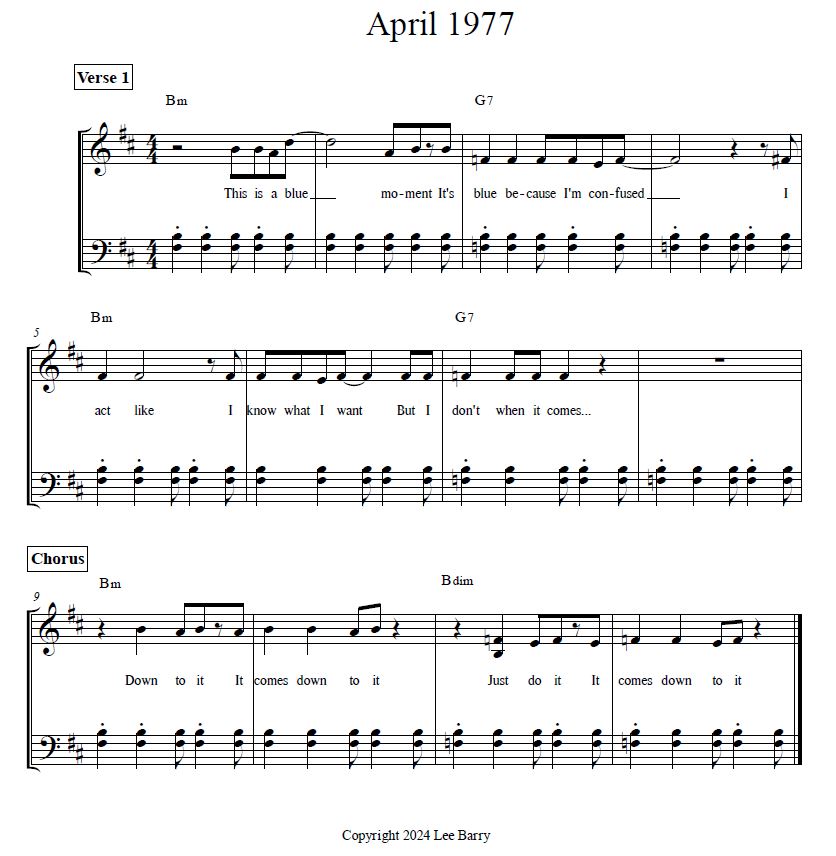April 29ths
The 4/29 song is based on a journal entry by the late artist Keith Haring, 4/29/1977:
This is a blue moment...it's blue because I'm confused, again; or should I say "still"? I don't know what I want or how to get it. I act like I know what I want, and I appear to be going after it—fast, but I don't, when it comes down to it...The full entry
Down to it
It comes down to it
Just do it
It comes down to it
Down to it
It comes down to it
Just do it
It comes down to it
This is a blue moment
It's blue because I'm confused
I act like I know what I want
But I don't when it comes down to it
4/29/2010
It’s interesting how suburbia affected pop music. Pop music would not have evolved as it has without the suburbs, as it allowed bands to rehearse in basements and garages. In the late 70s I was in a band that played Rush and other progressive rock and metal and we practiced in my garage at our home in suburban Chicago. My father said it rattled the gutters on the house. Try that in an inner city apartment or condo. Which then begs the question: how do restrictive and confined spaces affect the music? I once heard an artist comment that once he moved from a very small studio to a very large one, it allowed him to make the larger paintings he had been planning.
4/29/2021
If we look at music history as a training set as they do in machine learning, blues was the training set for rock ‘n’ roll, as was jazz—and still is to some degree. They’re both baked in the cake. If you use the training set from the last century, blues and jazz are in there. They’re in the collective unconscious for musicians. #riff
4/29/2023
Moonage Daydream (Second Viewing). Bowie is a perfect example of a person with right-hemispheric thinking and behavior, sometimes seeming aberrant, but under the control of the left hemisphere. Also, oddly, I liked watching it on a smaller screen as opposed to the theater. Different aspects came through in each venue. In the part of the film around the Outside album, I thought, “This is when the oldest Millennials were becoming teenagers and I was starting to write songs that were a product of 70s and 80s music.” On the arc of Bowie’s life, I’m a step behind him. At the end of the film, and his life, with the Blackstar album, the music now sounds like an attempt of what future music would sound like. But he wasn’t using AI—rather something that would appear on the scene in seven years of his death, but written traditionally, and perhaps nostalgically, as Jazz.
4/29/2025
When you're generating music with AI, you're either controlling the algorithms or the algorithms are controlling you. I haven't yet decided which one is better or worse. The good side of being controlled by algorithms is that they'll own you, i.e., they’ll steer the work in terms of genre, disabusing you from having to own them. For example, if I write some lyrics and it generates a blues/rock shuffle a la ZZ Top that has some interesting aspects to it, I’ll tend to keep it. If it were playing on a playlist, I might not skip it. But a blues shuffle is something I wouldn't be caught dead writing myself. This is proof that AI music is mostly a listener’s activity, entirely driven by text, either from a lyric you’ve written or a text prompt. This is not music composition by any stretch of the imagination. Songwriting perhaps…




Comments
Post a Comment